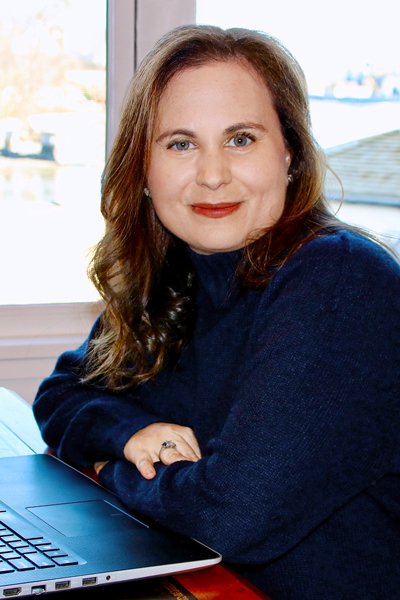|
Getting your Trinity Audio player ready...
|
By now, it’s happened to everyone. You start thinking about buying a new TV. You talk about it with your friends, mention it to your spouse over dinner, and keep an eye out for a good deal. Suddenly, ads for bargain big screens and the latest 4K displays pop up on your web browser and social media apps. Is Siri listening to your private conversations? Is someone spying on you? Are you just paranoid?

The answer is: none of the above. But chances are, you’re interacting with Criteo, a leading global tech ad company that impacts you every day, even though you don’t know it. Keri Topkins, senior legal director, says the privacy-respecting platform is noninvasive—and it’s her job to make sure it stays that way.
Criteo served up a staggering 1.4 trillion ads in 2019, and those ads helped more than 20,000 companies generate over $900 billion in sales. It’s all driven by robust commerce data, next-level AI, and a suite of solutions designed to help retail clients attract customers and boost sales.
The company uses a technique known as retargeting, with which they zero in on specific consumers based on internet use. While the practice may seem invasive, Topkins says Criteo doesn’t store, share, or track any personally identifiable information. Instead, the company’s sophisticated algorithm leverages anonymous behavioral data from an advertiser’s as well as a publisher’s URL to determine how and when to display certain ads. “All of our products have deep privacy protections built in,” Topkins says. “And our job as lawyers is to provide the best experience possible without ever knowing who the user is.”
Topkins is comfortable at the intersection of law, tech, privacy, marketing, and problem-solving. She started her career as a marketing coordinator for GT Interactive, the video game company behind popular first-person shooter games like Doom, Quake, and Unreal. She was in her office on April 20, 1999—the day the Columbine High School massacre brought a new level of scrutiny to the industry.
“All of our products have deep privacy protections built in. And our job as lawyers is to provide the best experience possible without ever knowing who the user is.”
Other positions at companies like Pixel Play (acquired by Oberon Media) exposed Topkins to massive cable deals, mobile gaming, and the early days of on-demand TV. Topkins was drafting legal templates for the white-label computer gaming company when the first smart TVs hit the market. “I had to create an app deal for the first time because TVs suddenly had apps,” she recalls. “I remember saying, ‘This is the future,’ and I’ve had to say that a lot in my legal career.”
In 2010, Topkins answered a job posting and went to work at News Corp. just as Rupert Murdoch’s massive media and publishing company was bracing for the digital revolution. Armed with a first-generation iPad, she served as commercial counsel for the Daily, billed as the world’s first digital newspaper.
Two years later, when the Daily folded and News Corp. split with Fox, Topkins managed some of the back-end commercial legal aspects of the spin-off. News Corp. became a tech hub, and advertising technology became ubiquitous. When a peer invited her to a two-day adtech conference, she accepted. They were the only two lawyers to attend.
Topkins joined Criteo as senior commercial counsel in 2017. She remembers getting to work at 7:30 a.m., and by 8:30 a.m., the company’s general counsel had announced her departure. The next week, a mid-market colleague went part-time and soon after went on sabbatical (and did not return). Her colleague in retail media went on paternity leave. Just months after she started, Topkins was responsible for the Americas region.
Today, she runs the go-to-market and commercialization for the sponsored advertising technology, coordinates data partnerships, and manages advertiser and supply guidelines.
“You have to understand the product that you’re doing the legal work for or you won’t give the best advice or create the best work product.”
At every step of her career, Topkins has put in the work to master the technology her employers use. “You have to understand the product that you’re doing the legal work for or you won’t give the best advice or create the best work product,” she says. “My team has to know Criteo’s process inside and out.” At Criteo, legal is more than a service; it’s a core part of the team. A three to six-month onboarding process ensures each person on the legal team knows every piece of the company’s complex policies, processes, and data.
Criteo started in 2005, and until recently, the French company operated with two separate retargeting and retail media teams. Retargeting relies on AI to deliver curated ads in real time, while retail media teams place sponsored ads on leading retailers. Recently, Topkins has been working with her department to help the teams provide both solutions in one holistic way.
To realize this goal, which will bring a seamless experience for users and advertisers alike, Topkins worked as part of the team for the platform transition. She is also doing the behind-the-scenes legal work to create one flat pricing model and move thousands of advertisers to Criteo’s new retail media platform.
The transition is just one of many big projects happening within Criteo legal, and Topkins is always keeping watch for the next big thing. “I keep thinking it’s something with blockchain or fintech. There hasn’t been a massive breakthrough in a while, but I think we’re on the verge,” she says. Chances are, when the future is here, Topkins will be the first to know.
***
Hahn & Hessen LLP:
“Congratulations to Keri Topkins for the recognition of her legal accomplishments. Keri’s business acumen, excellent judgment and collaborative spirit make her an exceptional leader and we are proud she chooses to partner with us.”
—Janine Figueiredo, Partner


